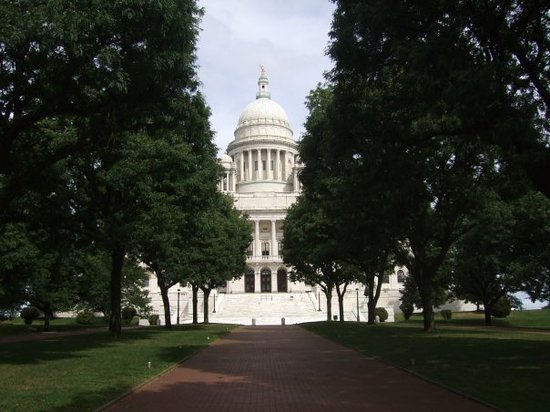-
Go
Pages
Members
Categories
Quicklinks
Events
-
Under the Dome: Coronavirus Update From a Legislative Perspective #2

Coronavirus Update From a Legislative Perspective
This segment of Under the Dome has been re-written numerous times in the last few days. As of Sunday at 4:30 p.m. the Rhode Island State will be closed this week, with a further evaluation of the timeframe to come.
Governor Raimondo’s declaration of a state of emergency triggered state anti-price gouging statutes.
Retailers are banned by law from charging “unconscionably high” prices for necessary products, which is defined as follows: “"Unconscionably high price" means the amount charged represents a gross disparity between the average prices at which the same or similar commodity was readily available and sold or offered for sale within the local trade area in the usual course of business during the thirty (30) days immediately before the declaration of the market emergency and the additional charges are not substantially attributable to increased cost to retailers, imposed by their suppliers, including replacement costs imposed by the vendors' source. Additionally, the average price calculation during said thirty-day (30) period shall not include discounted prices set and offered as a result of bona fide manufacturer's or supplier's limited discounts or rebates.”
A violation of the law triggers penalties – a flat $100 fine, and a second fine up to $1000 per violation with a cap of $25,000 in a 24-hour period.
Last Week At the State House
Minimum Wage – Governor Raimondo signed both H.7157 SubA and S.2147 SubA raising the minimum wage to $11.50 effective October 1, 2020.
Article 20 of the Budget – employer reporting requirement – The House Finance Committee heard testimony from a number of business groups last week concerning a RIte Share wrap around proposal put forth by the Governor. The proposal requires businesses with 50+ employees to:
1. Submit an annual report to the Executive Office and Health and Human Services and the Division of Taxation providing “sufficient and necessary information for the Medicaid agency to determine employee eligibility for RIte Share. The Chamber testified that this language is concerning because no one knows for sure what it means. Is it simply a list of employee who are covered by insurance and the health insurance plan offered by business? Is it a more comprehensive report providing personal information about each employee that does not have coverage including family income, size or alternate health care information? Failure to submit the information requested results in a $5000 fine which the Chamber also said was too high.
2. Submit quarterly reports outlining which employees are enrolled in the employer’s health care plan and which employees are not covered. The quarterly report must also include the names of
individuals no longer employed by the business. Failure to file this report brings a fine of $2500 – again, too high.
3. Refrain from offering employees a financial incentive to turn down the employer’s health insurance and remain on Medicaid. The Chamber raised concerns that this language could be interpreted to ban giving employees a bump in pay if they do not take the employer’s health insurance. Some employees choose to take a spouse’s or a parent’s health coverage. We want to be sure employees are not penalized for making good family choices, nor are employers penalized by requiring double coverage on employees.
It unclear whether these provisions would apply to businesses with 50 or more individuals working; or if, like the Affordable Care Act, it would apply to businesses with 50 or more FTEs (employees working 30 or more hours a week). ACA also excludes seasonal businesses where employees work less than 120 days a year or less than 4 calendar months. The Chamber suggested that any program, if it were to move forward, should utilize the ACA definition.
The Chamber will continue to monitor and advocate on this issue as it evolves during the budget process.
The following bills were filed last week: House Bill No. 7990 Corvese, Canario, Azzinaro, Ucci, Cortvriend, AN ACT RELATING TO COURTS AND CIVIL PROCEDURE - PROCEDURE GENERALLY - LEVY AND SALE ON EXECUTION (Exempts from attachment five hundred dollars ($500) in savings or deposits in financial or banking institutions.)
House Bill No. 7999 Casey, Kennedy, Shanley, AN ACT RELATING TO BUSINESSES AND PROFESSIONS -- CONTRACTORS' REGISTRATION AND LICENSING BOARD
House Bill No. 8000 Blazejewski, Solomon, Kazarian, Cassar, Johnston, AN ACT RELATING TO HEALTH AND SAFETY - CATASTROPHIC ILLNESS IN CHILDREN RELIEF FUND (Establishes Children's Catastrophic Illness in Children Relief Fund to provide finance assistance to families for medical expenses not covered by state or federal programs or insurance contract.)
House Bill No. 8002 Phillips, Shekarchi, Corvese, Filippi, Morin, AN ACT RELATING TO TAXATION -- ESTATE AND TRANSFER TAXES--LIABILITY AND COMPUTATION (Increases the exemption for estate taxes to two million five hundred thousand dollars ($2,500,000) effective January 1, 2022. There would be a further increased estate tax exemption to five million dollars ($5,000,000) effective January 1, 2024.)
House Bill No. 8004 Canario, Shekarchi, Jacquard, Kennedy, Craven, AN ACT RELATING TO COMMERCIAL LAW--GENERAL REGULATORY PROVISIONS -- DECEPTIVE TRADE PRACTICES (Makes it an unlawful practice to discriminate in the sale of a product or service based on a person's lawful employment or political affiliation/position.)
Tell a Friend
-
-
-
Chamber Events

